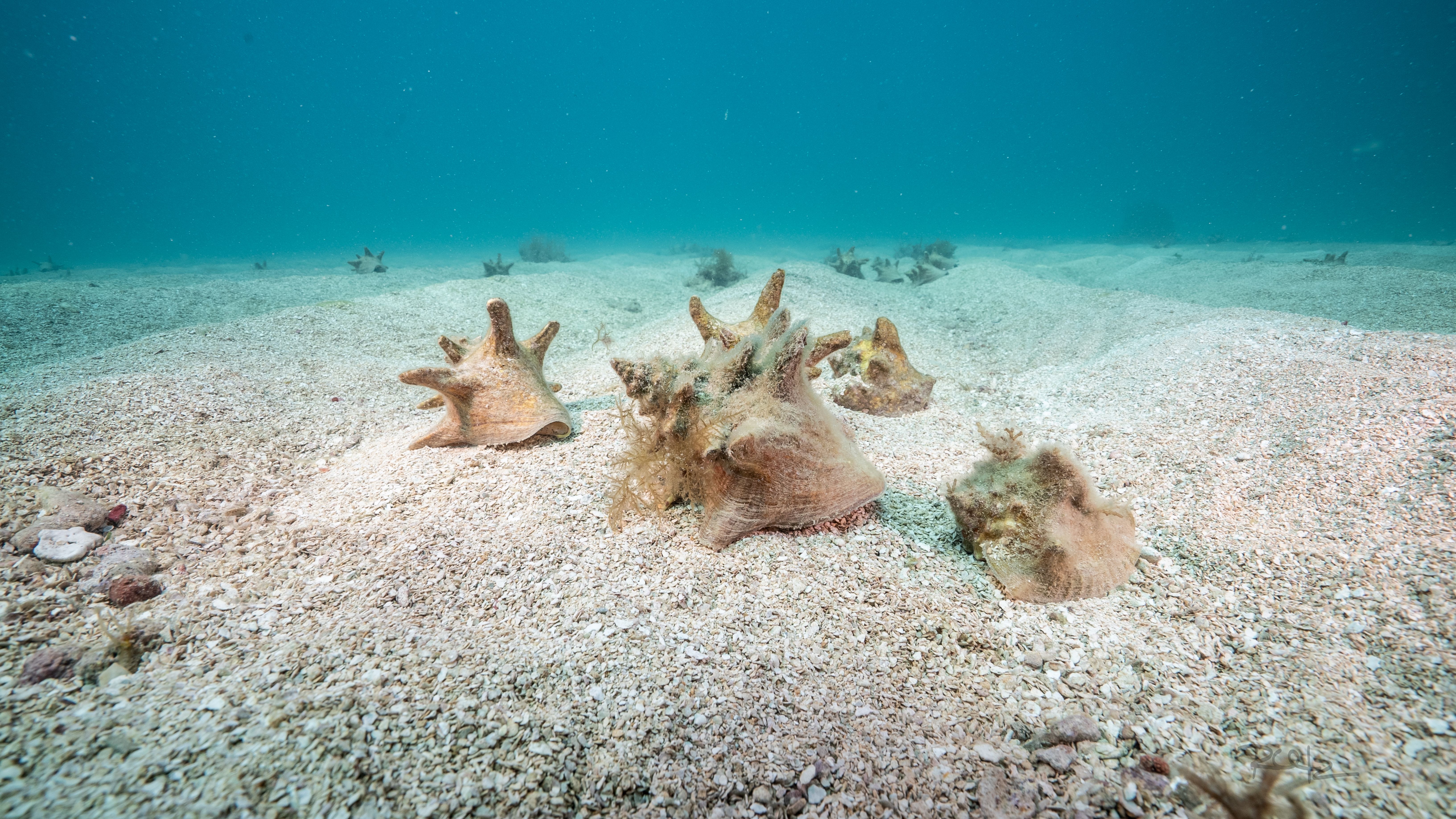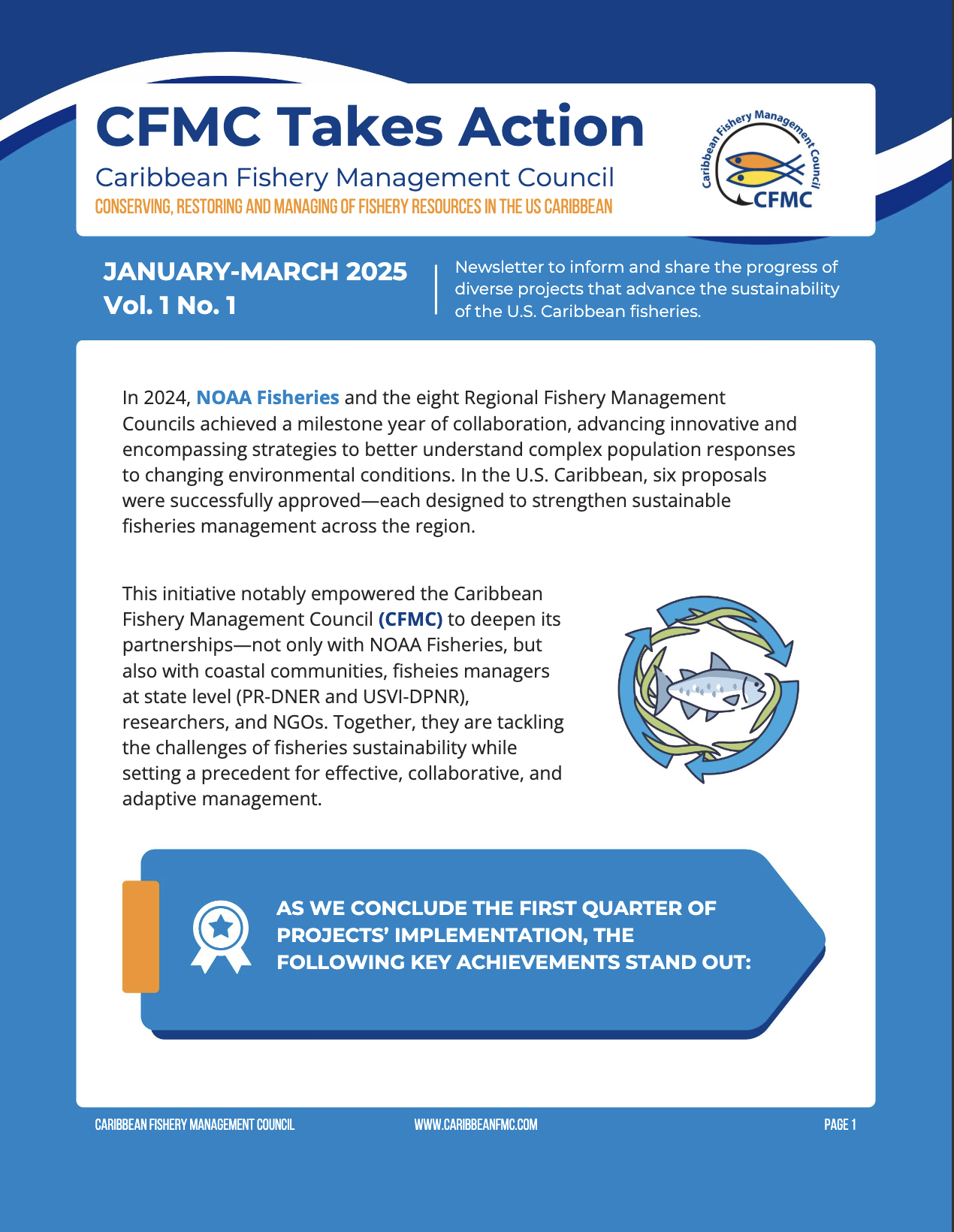Advancing Sustainable Fisheries
Overview
The Caribbean Fishery Management Council (CFMC) successfully secured competitive funding to strengthen its capacity to implement actions that leverage existing tools while addressing emerging challenges and threats to fisheries sustainability in the U.S. Caribbean. This funding opportunity, made available by NOAA Fisheries to Regional Fishery Management Councils, followed a rigorous technical review by independent experts. The selected proposals demonstrated clear, logical frameworks with measurable and achievable outcomes, all scheduled for completion within three years. On this page, you will find information about the six approved projects currently being implemented.
Approved Projects
Understanding Impacts of Extreme Events on the Fishery Ecosystem and the Fishers’ Communities in the U.S. Caribbean
Led by Consultores Educativos Ambientales, C.S.P., Dr. Álida Ortiz-Sotomayor (Emeritus Professor, environmental education specialist, and author of several educational books such as: Los arrecifes de coral, Ecosystem-Based Fishery Management, Marine Protected Areas, among others)
This project seeks to strengthen the CFMC outreach and education efforts to enhance understanding of extreme events and their impact on fishing communities, with the goal of fostering improved adaptation strategies and sustainable solutions. To support this effort, a storybook is being developed as the foundation for a series of in-person workshops with fishers and schoolteachers. These workshops will integrate scientific information with traditional knowledge collected from participants across the U.S. Caribbean. The training and educational activities aim to build stronger connections among diverse coastal community stakeholders, including commercial and recreational fishers, educators, scientists, government and non-governmental organizations, and members of the CFMC Outreach and Education Advisory Panel. Through these renewed partnerships, the CFMC expects to generate broader support for its initiatives, contributing to more effective and sustainable fisheries management.

Evaluating Priority Species Vulnerability to Changing Environmental Conditions
Led by Isla Mar Research Expeditions LLC, Dr. Chelsea Harms-Tuohy
Approximately 20 CFMC-managed fishery species (and some of ecological importance) will undergo a comprehensive assessment to evaluate their potential vulnerability to changing environmental conditions. The process will involve broad consultation with experts that incorporate the most recent scientific data and evaluation. Assessments will follow established NOAA protocols, with adaptations made as needed to better reflect local conditions and to integrate emerging tools and concepts. Results will be refined through input from the fishing community, to incorporate traditional ecology through both in-person and virtual engagements across the U.S. Caribbean. This effort builds on a preliminary initiative launched a decade ago and aims to provide critical information to support improved fisheries management by the CFMC. Outcomes will include detailed species profiles and templates with vulnerability indicators, which will also be made available to other interested partners and organizations.
Assessing the Ecological Needs of the Queen Conch and Nassau grouper, Two Species under Recovery Plans
Led by HJR Reefscaping, Dr. Héctor J. Ruiz-Torres and Dr. Michelle T. Schärer-Umpierre
Queen conch and Nassau grouper are two highly valued species that have been traditionally fished but are now subject to restrictive management measures aimed at their recovery. Both species are managed under recovery plans due to population declines. Unfortunately, they continue to face growing threats from extreme environmental events that degrade habitat quality and disrupt key biological processes. To ensure the effectiveness of these recovery plans, it is essential to incorporate updated information on habitat conditions and species responses. This project will support recovery efforts by conducting a detailed evaluation of critical habitats used for reproduction and recruitment in southwestern Puerto Rico. These habitats include submerged aquatic vegetation, sandy plains, and various coral reef-associated environments. Data collection will include assessments of essential habitats, qualitative and quantitative documentation of juvenile abundance, and analysis of long-term temperature trends in relation to reproductive phenology. Field-work has been designed and is carried out with local ecological knowledge to better assess the species’ habitat vulnerability and improve ecosystem based management strategies moving forward.

Adapting Red Hind and Spiny Lobster Sustainable Fisheries Management Scenarios to Extreme Changes in the US Caribbean
Led by the Gulf and Caribbean Research Institute (GCFI), Dr. Robert Glazer, Dr. Alejandro Acosta
In response to the growing impacts of extreme events on tropical marine resources, this project focuses on developing improved fisheries management scenarios for red hind and spiny lobster across the U.S. Caribbean. Final recommendations will be developed using a structured eight-step methodology implemented through dedicated in-country workshops. The process begins with defining management targets and desired outcomes, followed by mapping the spatial distribution of species and habitats. Next, participants will identify the most relevant scenarios, key dimensions to consider, and select three priority scenarios for deeper analysis. These scenarios will be informed by a combination of literature review, expert consultation, ecological modeling, and gap analyses. During the workshops, stakeholders will generate a broad set of adaptation options, which will be evaluated using the STAPLEE framework—assessing their feasibility based on social, technical, administrative, political, economic, and environmental factors. The final steps involve a detailed examination of the highest-ranking adaptation strategies, identification of trigger points for implementation, and development of monitoring plans to guide and support stakeholder-led action.
Understanding Impacts of Changing Environments and Fishing Pressure on Dolphinfish
Led by Beyond Our Shores Foundation, Dr. Wessley Merten
The dolphinfish is a highly valuable pelagic fishery species and an important predator within the marine ecosystem, serving as a biological and ecological link between the U.S. Caribbean and broader regions of the Western Atlantic. Its abundance and migration patterns are influenced by both natural variability and human activities, adding complexity to effective fisheries management. This project seeks to improve our understanding of dolphinfish movements and spatial distribution, investigate the drivers behind potential shifts in these patterns, and provide science-based recommendations to enhance dolphinfish management strategies. To achieve this, 30 satellite tags will be deployed on sub-adult and adult dolphinfish over a two-year period—10 tags each in Puerto Rico, the U.S. Virgin Islands, and to investigate movements in the Mid-Atlantic region. These will be complemented by the deployment of conventional tags to expand spatial and temporal coverage. Movement and abundance data from tagged individuals will be relative to fishery-independent oceanographic and meteorological data as well as fishery-dependent catch and effort data. This multi-scale, data-rich approach will help reveal patterns of connectivity across regions, assess the impact of environmental and anthropogenic changes, and inform more effective, adaptive management of the dolphinfish fishery.

Developing a US Caribbean Hub to Operationalize EBFM in the US Caribbean
Led by USVI Department of Planning and Natural Resources, Dr. Sennai Habtes
Through this project, the CFMC aims to finalize and adopt a comprehensive Fisheries Ecosystem Plan for the U.S. Caribbean and develop an open-source, cloud-based Data Management and Coordination System needed for training, collaborative tool development, and transparent access to information. The plan will integrate ecosystem indicators identified through stakeholder engagement and align multiple internal initiatives with complementary scientific outputs. Meanwhile, the Data Management and Coordination System will create an online Community of Practice developing the necessary research and management tools to improve Ecosystem Based Fisheries Management in the US Caribbean. A key component of the project is the development of a risk assessment framework that utilizes these indicators to guide management planning, decision-making, and actions at the Council level, supported through the interactive online Hub. This initiative will strengthen the CFMC’s capacity for adaptive, ecosystem-based management in the face of changing environmental and socio-economic conditions. It will also promote broad community involvement by combining expert input with inclusive participation. The project is expected to improve both the quality of scientific guidance and stakeholder engagement in fisheries governance.
CFMC Takes Action
Newsletter to inform and share the progress of diverse projects that advance the sustainability of the U.S. Caribbean fisheries.
January - March 2025



